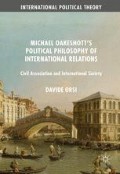Abstract
Oakeshott’s thought has been considered from a rich variety of perspectives and has been interpreted as an innovative contribution to contemporary liberalism, conservatism, and republicanism. However, little attention has been devoted to the influence of Oakeshott’s political philosophy of civil association on the study of international relations and law. It is argued in this work that current debates in normative international political theory and international relations theory could benefit from Oakeshott’s philosophy of practical reasoning and of civil association.
Access this chapter
Tax calculation will be finalised at checkout
Purchases are for personal use only
Bibliography
Abel, C., ed. 2010. The Meaning of Oakeshott’s Conservatism. Exeter: Imprint Academic.
Boucher, D. 1998. Political Theories of International Relations. Oxford: Oxford University Press.
———2001. The Idealism of Michael Oakeshott. Collingwood and British Idealism Studies VIII: 73–98.
———2005a. Oakeshott, Freedom and Republicanism. British Journal of Politics and International Relations VIII: 81–96.
———2012a. The Victim of Thought: The Idealist Inheritance. In A Companion to Michael Oakeshott, eds. P. Franco and L. Marsh, 27–69. University Park: Pennsylvania University Press.
———2012b. Oakeshott in the Context of British Idealism. In The Cambridge Companion to Oakeshott, ed. E. Podoksik, 247–273. Cambridge: Cambridge University Press.
Brown, C. 1992. International Relations. New Normative Approaches. New York: Columbia University Press.
Brown, C. 2013. The Poverty of Grand Theory. European Journals of International Relations 19(3): 483–497.
Brown, C., et al. 2002. International Relations in Political Thought: Texts from the Ancient Greeks to the First World War. Cambridge: Cambridge University Press.
Callahan, G. 2012. Oakeshott on Rome and America. Exeter: Imprint Academic.
Coats, W.J. 1992. Some Correspondences Between Oakeshott’s Civil Association and the Repubblican Tradition. Political Science Reviewer 21: 99–115.
Devigne, R. 2012. Oakeshott as Conservative. In A Companion to Oakeshott, eds. P. Franco and L. Marsh, 268–289. University Park, PA: Pennsylvania University Press.
Dunne, T., et al. 2013. The End of International Relations Theory. European Journal of International Relations 19(3): 405–425.
Ferrands, C., and C. Moore, eds. 2010. International Relations Theory and Philosophy: Interpretative Dialogues. London: Routledge.
Franco, P. 1990. The Political Philosophy of Michael Oakeshott. New Haven-London: Yale University Press.
Franco, P. 2004. Michael Oakeshott. An Introduction. New Haven-London: Yale University Press.
Frost, M. 2002. Constituting Human Rights: Global Civil Society and the Society of Democratic States. London: Routledge.
Galston, W.A. 2012. Oakeshott’s Political Theory: Recapitulation and Criticisms. In The Cambridge Companion to Oakeshott, ed. E. Podoksik, 222–245. Cambridge: Cambridge University Press.
Gamble, A. 2012. Oakeshott’s Ideological Politics: Conservative or Liberal? In The Cambridge Companion to Oakeshott, ed. E. Podoksik, 153–176. Cambridge: Cambridge University Press.
Giorgini, G. 1999. Liberalismi Eretici. Trieste: Edizioni Goliardiche.
Gray, J. 1989. Oakeshott on Law, Liberty and Civil Association. In Gray, J. Liberalism: Essays in Political Philosophy. London: Routledge, pp. 199–216.
Gray, J. 1993. Oakeshott as a Liberal. In Gray, J. Post-Liberalism: Studies in Political Thought. London: Routledge, pp. 40–46.
Haddock, B. 2005. Contingency and Judgment in Oakeshott’s Thought. European Journal of Political Theory 4(1): 7–21.
Jackson, R. 2000. The Global Covenant. Human Conduct in a World of States. Oxford: Oxford University Press.
Lake, D.A. 2013. Theory is Dead, Long Live Theory: The End of the Great Debates and the Rise of Eclecticism in International Relations. European Journals of International Relations 19(3): 567–587.
Lebow, R.N. et al. eds. 2016. The Return of the Theorists. Dialogues with Great Thinkers in International Relations. London: Palgrave Macmillan.
Nardin, T. 1983. Law, Morality and the Relations of States. Princeton: Princeton University Press.
Nardin, T. 2001. The Philosophy of Michael Oakeshott. University Park: Pennsylvania University Press.
Oakeshott, M. 1991. In Rationalism in Politics and Other Essays. Ed. T. Fuller. 2nd edn. Indianapolis: Liberty Fund.
Orsi, D. 2012. Philosophy and Criticism. Conversation in Michael Oakeshott’s Thought. Collingwood and British Idealism Studies 18(1): 7–29.
Podoksik, E. 2003. In Defence of Modernity: Vision and Philosophy in Michael Oakeshott. Exeter: Imprint Academic.
Podoksik, E. 2012. Oakeshott in the Context of German Idealism. In The Cambridge Companion to Oakeshott, ed. E. Podoksik, 274–295. Cambridge: Cambridge University Press.
Prokhovnik, R., and G. Slomp. 2011. International Political Theory After Hobbes. London: Palgrave.
Rawls, J. 1999. The Law of Peoples. Cambridge, MA: Harvard University Press.
Rengger, N. 2013. Just War and International Order. The Uncivil Condition in World Politics. Cambridge: Cambridge University Press.
Reus-Smit, C. 2012. International Relations, Irrelevant? Don’t Blame Theory. Millennium—Journal of International Studies 40(3): 525–540.
Vincent, A. 2015. The Ideological Context of Impact. Political Studies Review 13: 474–484.
Author information
Authors and Affiliations
Rights and permissions
Copyright information
© 2016 The Author(s)
About this chapter
Cite this chapter
Orsi, D. (2016). Introduction. In: Michael Oakeshott's Political Philosophy of International Relations. International Political Theory. Palgrave Macmillan, Cham. https://doi.org/10.1007/978-3-319-38785-7_1
Download citation
DOI: https://doi.org/10.1007/978-3-319-38785-7_1
Published:
Publisher Name: Palgrave Macmillan, Cham
Print ISBN: 978-3-319-38784-0
Online ISBN: 978-3-319-38785-7
eBook Packages: Political Science and International StudiesPolitical Science and International Studies (R0)

